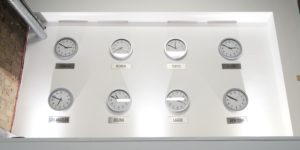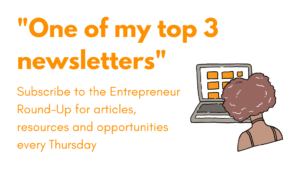Creatives & The Importance Of Network: How These 2 Founders Are Creating Community
Farouk Deen and Mark Sarfo have a lot on their CVs. Though the three companies they’ve founded together reach different customers, they’ve managed to feed their knowledge, vision and network into all of them to create a vast community where professional creatives can thrive. We spoke to Farouk about how they leverage the incredible power of network – and encourage others to do the same.
The two of you founded three distinct businesses. Tell us about your first, Cellar Door.
Cellar Door is an audacious promotions management group. The core of the business is that it challenges perceptions by implementing groundbreaking creative experiences unconstrained by venue capacity or location.
We’ve established a basic principle, which is that brands that lead culture are more successful than those that follow it. In that context, we specialise in global integration on behalf of our clients and, unique to us as an events management company, we put our own money where our mouth is and integrate our own in-house brands.
Next, you launched NEXUS and Coffee Shotter. How do they intersect?
NEXUS is a co-working space and network made by creatives for creatives. Mark and I are ex-bankers and what we noticed throughout our own careers is that we would get asked a lot of rudimentary basic business principles, and we’d observe that people may be experts in their creative fields but there are universal business approaches and acumen that you need in place to actually be a professional creative. That’s the solution we’re providing.
Coffee Shotter is a by-product of this main objective and grew in terms of our focus as a brand. Our statement is very bold: we supply the world’s best coffee. That’s it. At the same time, we’re completely plant-based.
What is the concept behind NEXUS?
Originally, we wanted the space to be fashion-focused. One of my very good friends is the Head of Menswear & Design at River Island, and at the time she told us that fashion graduates were really struggling from lack of access to equipment and software. We had been pioneers in streetwear in the mid-2010s with Cellar Door working with brands like Trapstar, Playdot and Benjart, but the market in general has plateaued. Under the advice of a friend, we expanded the scope of what we’re looking to cater for; that emphasis on providing infrastructure and software stayed and we expanded our scope to the creative industry through NEXUS.
NEXUS is for the creative professionals that don’t fit into the ‘nine-to-five’ mold or members’ club space, and who also find themselves always operating ‘away from home’. Working from home can be lonely if you’re a freelancer or sole trader, and so NEXUS serves as a ‘HQ’ for creatives.
What value do you provide for your members?
We wanted to provide our members with the ability to ‘intimidate’ their clients. When you pitch to clients, you walk into their fancy office, and in return you don’t necessarily have a space of your own. It was with that in mind that we decided to invest in top-end quality with everything in NEXUS, to match any version of your clients. There’s something to be said about asking for high figure briefs when you’re in a good quality space!
Being a business environment, we leverage our existing relationship with key corporates to provide their skills, access and knowledge to our members. We’ve worked with Natwest to provide banking advice, accountancy firm Johnson & Co. for financial advice, solicitors Streeter Marshall for legal consultations, and a HR department for HR support. When you’re a member of NEXUS, you’re a creative but you’ve got the infrastructure to run the business element.
Why did you decide to integrate Coffee Shotter, a café that’s open to the public?
The space Coffee Shotter occupies [in front of the NEXUS offices] was originally going to be members only, but Croydon Council wanted our unit and that entire stretch of high street to be public retail space. We’re no strangers to ‘receiving briefs’, so we had to decide: what does a coffee shop from Cellar Door look and sound like?
First, Mark identified the ‘plant-based’ movement as a growing culture we should move into. Second, we wanted to make everything inside the coffee shop the best quality it can be. Our coffee is the best coffee in the world; we have the best coffee machine; we source the best coffee beans and always have five star hygiene. Those were the key things we needed to see.

The NEXUS space
Why is your menu plant-based?
We built the Facebook group Plant Based South London before we even had the shop. We wanted to build that community online because, as I said before, we believe that brands that lead the culture are bigger than the followers of the culture.
One of our key objectives here is to change the stigma around plant-based food, demystifying the ideas around how much this lifestyle costs and who the types of people are that follow it. We don’t talk about the politics of it, but prefer to target hedonism: if something tastes good, it tastes good! It was really about opening the channels to showcase and identify the wonderful recipes available worldwide.
How long did it take you to find the perfect location?
Through Cellar Door, we specialise in implementing creative content in a variety of venues and locations. That’s not a challenge to us. We always focus on understanding the box we’re given and thinking creatively outside it.
We first looked at location; we knew that Croydon was a promising area in terms of infrastructure, travel connections, hotel network, and so on. Croydon was a sleeping giant – it isn’t as far as everything thinks!
In terms of the site itself, it used to be a sushi restaurant and had a full-on kitchen area, but leaning on our expertise as creatives, we took it on and transformed it.
What were your priorities during your first few weeks of operating?
It’s a learning curve. There’s a lot you have to look at, and I don’t think it’s a case of ‘hitting the ground running’, at least not for the first iteration.
In terms of our priorities, we knew we had to believe that our own network was the starting base to what we could create with NEXUS. There’s nothing like us that has existed before; we had to educate our members to get used to the fact they have an ‘HQ’ and a network, and it was through conversations with other creatives that we figured out how best to do that. We told our contacts to tell their contacts, leveraging the network we come from.
There are also traditional online channels that we advertise on and we hire out the space to third parties. As we go on, we’re now communicating to people that creatives do not traditionally have this network and HQ in their facility, and nor does Black British culture.

Tell us about the expansion plans you have for Coffee Shotter and NEXUS.
NEXUS is about the infrastructure and software as much as the network, which is why we will be opening a recording and photo studio in King’s Cross. We also want to open spaces in Accra and LA, although COVID-19 has concertinaed our expansion plans in the short term. Online, we already are global – if people want contacts in China, LA and Asia, they can access them through our network.
For Coffee Shotter, our short-term plan is to focus on digital content creation and experiential-based activity – after all, that’s what we’re experts in. We did have a new Coffee Shotter in the pipeline in Paddington, but due to lockdown we’re taking things day-by-day. We might open another site somewhere else, but the market has shifted and we’ll have to go back and litmus test our decision-making. You’ll more likely see us in pop-up guise than a static space in the near future.
What’s been your greatest challenge so far?
One of the biggest challenges is finding financial entities that are willing to invest in SMEs and that truly understand what they are about. Thanks to mine and Mark’s background in banking, we’ve done well at securing investment, but the realities are that as a market and a culture, there aren’t enough investors and venture capital funds that really understand what success looks like for a company like ours.
We’ve used our own money to grow the businesses to a valuation of £3.5 million pre-COVID-19. Talking to our immediate peers and angel investors, they expect you to have a minimum turnover, but we know for a fact that those factors don’t tell you the real strength of the business.
Cash flow is another huge challenge. Mark and I made the call on March 16 that our Croydon and King’s Cross sites had to be closed down to protect the health and safety of our team and customers. We furloughed the team and in a two week period saw over £500,000 evaporate – a lot of income that fuelled us was through events and the industry was decimated. That was tough medicine to swallow.
What attracted you to working with Jamii?
I look for mainstream production quality, and Jamii brings that to the businesses they work with with their attention to detail and level of execution.
We don’t work with people we don’t like, and people forget that you have to be charming to build business relationships. [Jamii founder] Khalia is a pleasure to deal with – and so for us it was a no-brainer.